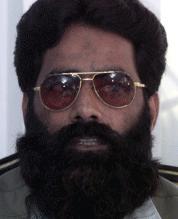|
|
|
Ilyas Kashmiri, the leader of the Harakat-ul-Jihad-al-Islami and al Qaeda’s Brigade 313. |
The Asia Times‘ Syed Saleem Shahzad has published his interview with Ilyas Kashmiri, a senior al Qaeda leader and longtime Pakistani jihadi with strong ties to Pakistan’s military and intelligence services who was thought to have been killed in a US airstrike in mid-September. As the operations chief of Brigade 313, one of six brigades in the Lashkar al Zil, al Qaeda’s “Shadow Army,” Kashmiri is suspected of planning and leading some of the terror group’s most sophisticated assaults in the Afghan-Pakistan theater.
Kashmiri is described by Shahzad as being essentially the military operations chief of al Qaeda:
If today al-Qaeda is divided into three spheres, Osama bin Laden is undoubtedly the symbol of the movement and his deputy Ayman al-Zawahiri defines al-Qaeda’s ideology and broader strategic vision. Ilyas, with his unmatched guerrilla expertise, turns the strategic vision into reality, provides the resources and gets targets achieved, but he chooses to remain in the background and very low key.
This is interesting. Saif al Adel is often described to me as al Qaeda’s equivalent of the Chairman of the Joint Chiefs of Staff and Defense Secretary rolled into one person, while Abdullah Sa’id is the head of al Qaeda’s Shadow Army (the Lashkar al Zil). Kashmiri has been described as the operations commander of Brigade 313, but Shahzad’s description indicates he is far higher is the pecking order than that.
The interview is sure to stir some controversy among those who follow the region. For instance, Shahzad claimed Kashmiri is not a former commando in Pakistan’s Special Services Group (other Pakistani journalists and my sources maintain that he is). Shahzad repeats a story of Indian troops kidnapping and beheading civilians for sport, and Kashmiri’s attacking to avenge the acts (Indians maintain this never happened, I have yet to see evidence it has).
Kashmiri claims that al Qaeda’s goal remains focused on defeating the “Great Satan” – the US – and that Afghanistan has been a trap for US and Western forces.
Kashmiri also intimates that a new round of Mumbai-styled attacks is forthcoming:
“So should the world expect more Mumbai-like attacks?” I asked. [Shahzad]
“That was nothing compared to what has already been planned for the future,” Ilyas replied.
“Even against Israel and the USA?” I asked.
“Saleem, I am not a traditional jihadi cleric who is involved in sloganeering. As a military commander, I would say every target has a specific time and reasons, and the responses will be forthcoming accordingly,” Ilyas said.
The jihadi nexus has already carried out several such attacks in Pakistan, including last weekend’s assault on Pakistan’s Army headquarters. Kashmir’s understudy, Dr. Usman, led the attack.
Are you a dedicated reader of FDD's Long War Journal? Has our research benefitted you or your team over the years? Support our independent reporting and analysis today by considering a one-time or monthly donation. Thanks for reading! You can make a tax-deductible donation here.









4 Comments
Great. So we missed and now he’s becoming the latest jihadi superstar (following Baitullah and Zarqawi before him.)
Oh well, patience my fellow Jedi.
Reading through the article, I’m going to call BS. Those quotes supposedly made by Kashmiri are just a little too perfect, a little too complete. They in fact drive the narrative of the story. It reads like the most literate Zawahiri video ever made. Overwrought, in fact.
Like they were written by a man with a world-class education and had spent his career practicing and refining his writing skills. Not spoken by a cave dweller who has spent his life evading arrest and planning ambushes.
These South Asian chaps are generally very educated and speak and construct English very well. This is true of the Pak officers. I have never met any of their commandos or Special Services Officers; I suspect they are a cut above the “regular” Pak officers tactically and intellectually. The regular officers are pretty good. The enlisted corps and NCOs, I don’t have an experience to draw from.
Musharraf was former SSG (hence his nickname by his critics, “The Commando”), so one only has to look to his mannerisms to see how the rest of Army SSG is like.